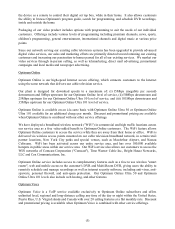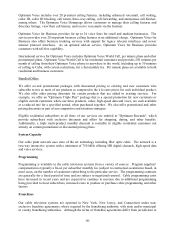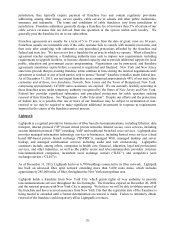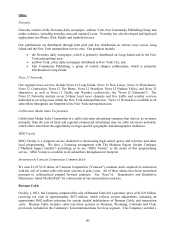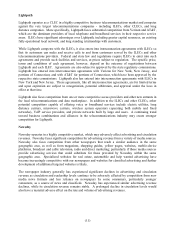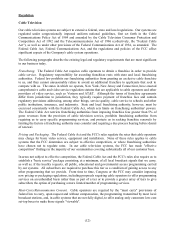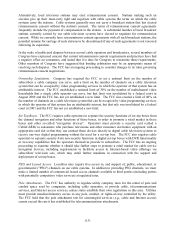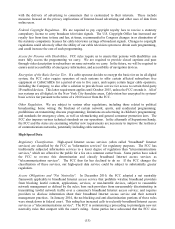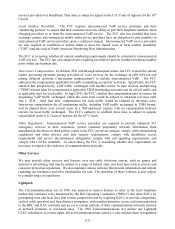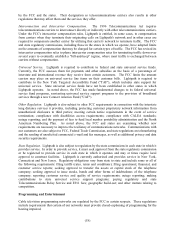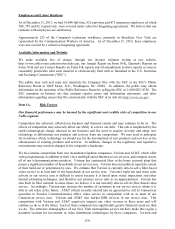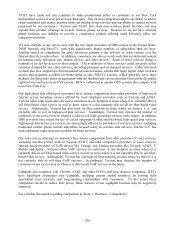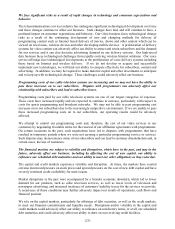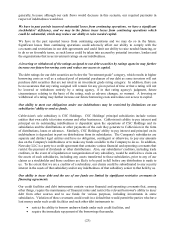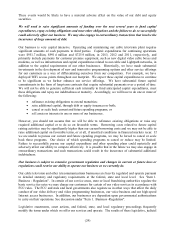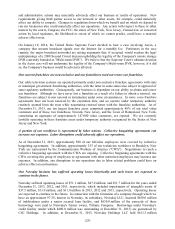Cablevision 2013 Annual Report Download - page 21
Download and view the complete annual report
Please find page 21 of the 2013 Cablevision annual report below. You can navigate through the pages in the report by either clicking on the pages listed below, or by using the keyword search tool below to find specific information within the annual report.(15)
with the delivery of advertising to consumers that is customized to their interests. These include
measures focused on the privacy implications of Internet-based advertising and other uses of data from
online users.
Federal Copyright Regulation. We are required to pay copyright royalty fees to receive a statutory
compulsory license to carry broadcast television signals. The U.S. Copyright Office has increased our
royalty fees from time to time and has, at times, recommended to Congress changes in or elimination of
the statutory compulsory licenses for cable television carriage of broadcast signals. Changes to copyright
regulations could adversely affect the ability of our cable television systems to obtain such programming,
and could increase the cost of such programming.
Access for Persons with Disabilities. FCC rules require us to ensure that persons with disabilities can
more fully access the programming we carry. We are required to provide closed captions and pass
through video description to subscribers on some networks we carry. In the future, we will be required to
ensure aural accessibility of emergency information, and accessibility of navigation devices.
Encryption of the Basic Service Tier. If a cable operator decides to encrypt the basic tier on its all-digital
system, the FCC rules require operators of such systems to offer certain affected subscribers free
equipment or CableCARDs for a period of one to five years, and require certain larger cable operators,
including the Company, to also offer a solution to provide basic service tier access to certain third-party
IP-enabled devices. This latter requirement applies until October 2015, unless the FCC extends it. All of
our systems are all-digital; in the New York City franchise areas, Cablevision has encrypted its systems'
basic service tier pursuant to the terms of a 2010 waiver from the FCC.
Other Regulation. We are subject to various other regulations, including those related to political
broadcasting; home wiring; the blackout of certain network, sports, and syndicated programming;
prohibitions on transmitting obscene programming; limitations on advertising in children's programming;
and standards for emergency alerts, as well as telemarketing and general consumer protection laws. The
FCC also imposes various technical standards on our operations. In the aftermath of Superstorm Sandy,
the FCC and the states are examining whether new requirements are necessary to improve the resiliency
of communications networks, potentially including cable networks.
High-Speed Data
Regulatory Classification. High-speed Internet access services (often called "broadband" Internet
services) are classified by the FCC as "information services" for regulatory purposes. The FCC has
traditionally subjected information services to a lesser degree of regulation than "telecommunications
services," which are offered to the public for a fee on a common carrier basis. Some parties have asked
the FCC to reverse this determination and classify broadband Internet access services as
"telecommunications services". The FCC thus far has declined to do so. If the FCC changes the
classification of these services, our high-speed data service could be subject to substantially greater
regulation.
Access Obligations and "Net Neutrality". In December 2010, the FCC adopted a net neutrality
framework applicable to broadband Internet access service that prohibits wireline broadband providers
from blocking lawful content, applications, services, or non-harmful devices, subject to reasonable
network management as defined by the rules; bars such providers from unreasonably discriminating in
transmitting lawful network traffic over a consumer's broadband Internet access service; and requires
providers to disclose information about their broadband Internet access service and their network
management practices. In January 2014, the no-blocking and anti-discrimination portions of these rules
were struck down in federal court. This ruling has increased calls to reclassify broadband Internet access
service as a "telecommunications service". The FCC is commencing a proceeding to promulgate new net
neutrality rules that comport with the court's ruling. Some parties have advocated that the FCC also


